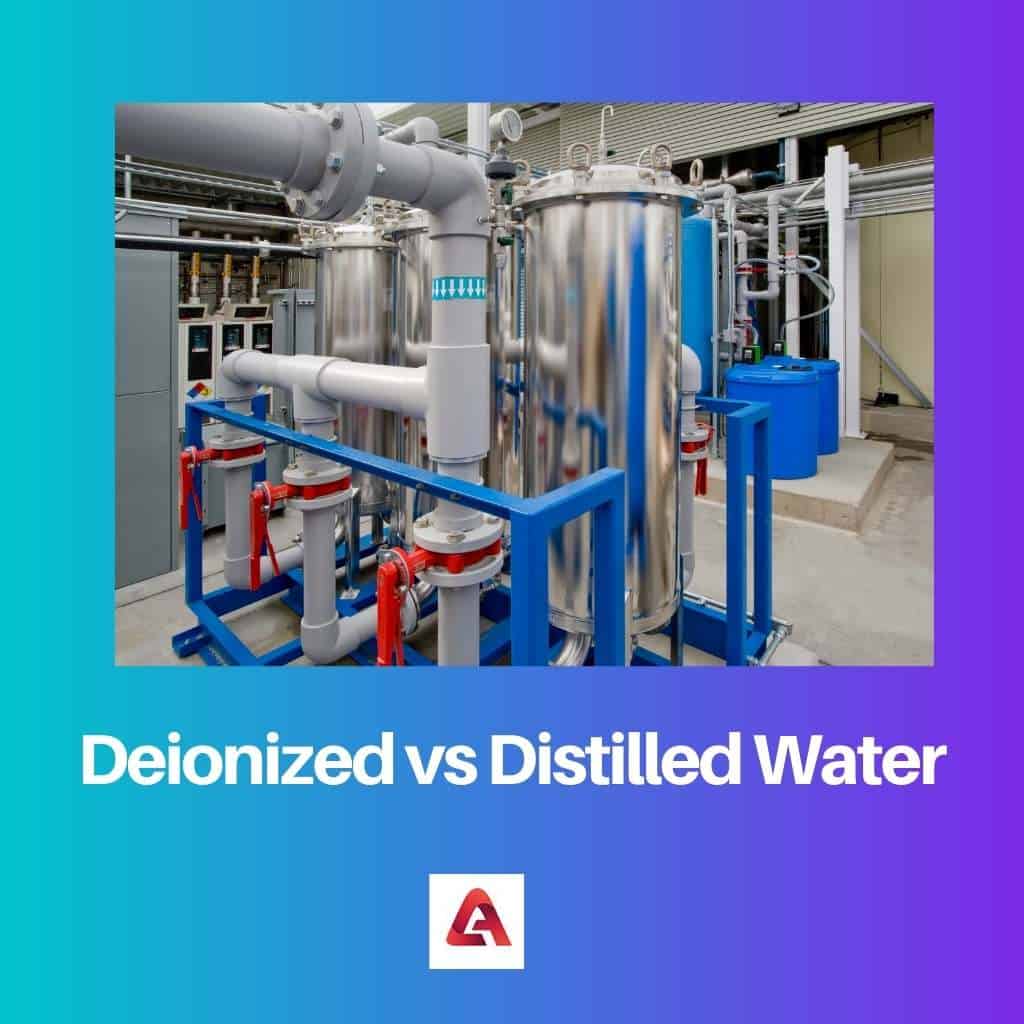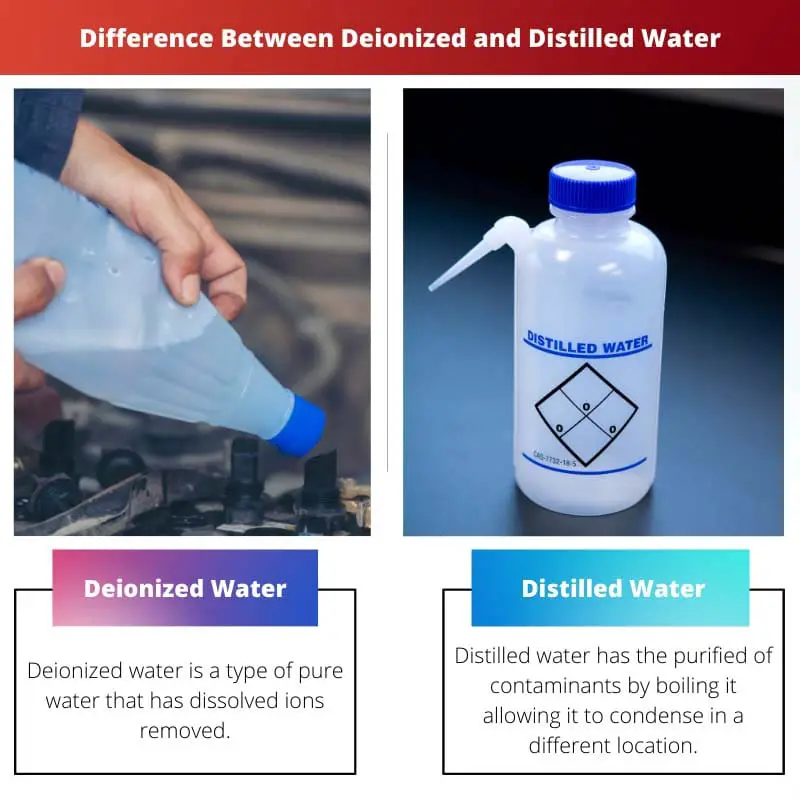Water is the basic and important element in every living organism’s life. According to the level of purity and key features, they are classified into various types.
Deionized and distilled water is one of them. Not all water types are suitable for various activities such as laboratories, medicines, and much more, so the selection of water types has to be done carefully.
Key Takeaways
- Distilled water is produced through boiling and condensation that removes impurities, while deionized water is produced by removing all ions and minerals from the water.
- Deionized water is used in laboratory settings, while distilled water is commonly used for drinking and other household purposes.
- While both types of water are considered “pure,” distilled water may still contain some impurities, while deionized water is completely free of ions and minerals.
Deionized vs Distilled Water
The difference between deionized and distilled water is that deionized water focuses on removing electrically charged ions, whereas distilled water focuses on removing various forms of contaminants without considering the charge. However, both are pure forms of water. Distilled water is 99.9% pure, whereas the purity depends on the water quality of deionized water.

Deionized water, also known as DI water has no ions present in it, making it a pure form of water. Because of its extreme purity, deionized water is expensive. The majority of ions have an electric charge on them.
This charge is removed by demonizing water. As a result, it’s widely employed in a variety of industries for a variety of purposes. It has a pH of 7, but when it is exposed to the oxygen and carbon dioxide in the air, the pH comes to 5.6.
On the other side, distilled water is prepared by boiling the water into vapours, and then the condensed vapours are cooled down to form liquid again and collected in a vessel.
When water starts evaporating, it leaves behind all the non-volatiles mixed in it, though some volatiles will also evaporate. The water will be nearly pure H2O after it re-condenses in a separate container.
Comparison Table
| Parameters of Comparison | Deionized Water | Distilled Water |
|---|---|---|
| Definition | Deionized water is a type of pure water that has dissolved ions removed. | Distilled water has the purified of contaminants by boiling it allowing it to condense in a different location. |
| Change of phase | No change | Liquid-Gaseous-Liquid |
| Purity level | If made from tap water then 90-99% | 99.9% |
| Conductivity | Low conductivity | High conductivity |
| Making process | Ion-Exchange method, RO method | Vaporization and re-condensation |
What is Deionized Water?
DI water is free from ions, these ions are mineral salts like calcium and iron, so it is also called “Demineralized water”. Some of the numerous uses in which deionized water is preferred.
It does not affect test results because it is a pure form of water having low conductivity, so all the ions are removed. As a result, it’s an excellent choice for industry settings involving machinery.
Deionized water is widely utilized in specific contexts since it is the purest water available. To extend the life of a motor, deionized water is employed as a coolant system.
For making medicines, “water for injection” is used, the first step is to make the water deionized. It can be achieved by various methods of purification like the Ion-Exchange (IX) method, Electrodeionisation (ID), Reverse Osmosis (RO), etc.
DI water’s benefits are that it is not corrosive so it will not react with metallic elements, it is simple to produce, and it easily gets diluted without contaminating other solutions.
It is used as a good cleaning agent for lab purposes due to its pureness. It is safe to drink DI water but not ideal for drinking. Deionization emerged recently from the last century when electrochemical methods for purifying water were used in studies.
What is Distilled Water?
Distilled water is a pure aspect of water with negligible minerals, salts, and organic materials. The process of collecting distilled water is to heat the water and collect the condensed steam of the boiling water.
The lack of minerals in distilled water deprives users of the essential nutrients, however, studies suggest that the majority of these minerals are obtained through food.
Even electrolytes like potassium and other minerals your body requires are absent in distilled water, leading to missing micronutrients.
Some studies have discovered a link between calcium and magnesium-deficient water and fatigue, muscle cramps, weakness, and heart disease.
Furthermore, distilled water can dehydrate you, which makes it unsuitable for drinking. Distilled water can be substituted by several alternatives like purified water, Reverse osmosis water, spring water, demineralized water and much more.
The following are the common application examples: It is used to sterilize hospital materials to avoid contamination and infections.
Distilled water is used in laboratory tests because nothing in it affects the accuracy. The water used in moisturizers, shampoo, or other cosmetic products is always distilled.
It has non-corrosive properties that will help automobile engines to extend shelflife.

Main Differences Between Deionized and Distilled Water
- Distilled water is purer than deionized water because distilled water removes every contaminant and pathogen irrespective of the charged ions in it, but deionized water only removes the charged particles and not the uncharged particles like viruses.
- Deionized water does not conduct electricity, while distilled water conducts electricity.
- Deionized water is corrosive, whereas distilled water is non-corrosive, so it is used in metal-working industries.
- Distilled water can be achieved by a simple process like boiling and condensing the water, but in the case of deionized water processes like the Ion-Exchange method, the RO method is used.
- A shift in the phase achieves distilled water, whereas a change in phase does not make deionized water.
- Distilled water has been used since the era’s whereas deionized water has been started using for the past hundred years.

- https://www.sciencedirect.com/science/article/pii/S0925521499000502
- https://ascelibrary.org/doi/abs/10.1061/(ASCE)0733-9372(2002)128:3(253)

This article is very informative and covers the topic extensively. It should be very useful for people needing to understand differences between water types.
It is interesting to note that distilled water conducts electricity, while deionized water doesn’t. I did not know that, and I work in this field.
I strongly disagree with the statement that distilled water is commonly used for drinking and other household purposes. It is not suitable for drinking and its use for that purpose is limited.
Interesting article, the comparison between deionized and distilled water was enlightening, I hope to read more like this one in the future.
Sarcasm: Wow, I’m sure my car’s engine will love sipping some distilled water! Thanks for the laugh.
I liked the comparison table, it provides a very clear summary of the differences between deionized and distilled water.